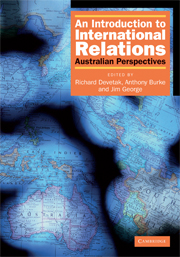Book contents
- Frontmatter
- Contents
- List of tables, figures and boxes
- List of contributors
- Preface and acknowledgments
- An introduction to international relations: the origins and changing agendas of a discipline
- 1 Theory and practice in Australian international relations: the search for identity and security
- Part 1 Theories of international relations
- Part 2 The traditional agenda: states, war and law
- Part 3 The new agenda: globalisation and global governance
- 20 Multilateral economic institutions
- 21 Global trade
- 22 Global finance
- 23 Non-state actors: multinational corporations and international non-governmental organisations
- 24 Global poverty and inequality
- 25 Globalisation and its critics
- 26 The globalisation of Islam
- 27 Global terrorism
- 28 Humanitarianism and armed intervention
- 29 Human rights
- 30 Migration and refugees
- 31 Global environmental politics
- 32 Global governance and the United Nations
- Glossary of terms
- Bibliography
- Index
- References
24 - Global poverty and inequality
from Part 3 - The new agenda: globalisation and global governance
- Frontmatter
- Contents
- List of tables, figures and boxes
- List of contributors
- Preface and acknowledgments
- An introduction to international relations: the origins and changing agendas of a discipline
- 1 Theory and practice in Australian international relations: the search for identity and security
- Part 1 Theories of international relations
- Part 2 The traditional agenda: states, war and law
- Part 3 The new agenda: globalisation and global governance
- 20 Multilateral economic institutions
- 21 Global trade
- 22 Global finance
- 23 Non-state actors: multinational corporations and international non-governmental organisations
- 24 Global poverty and inequality
- 25 Globalisation and its critics
- 26 The globalisation of Islam
- 27 Global terrorism
- 28 Humanitarianism and armed intervention
- 29 Human rights
- 30 Migration and refugees
- 31 Global environmental politics
- 32 Global governance and the United Nations
- Glossary of terms
- Bibliography
- Index
- References
Summary
Introduction
This chapter examines poverty and inequality in global politics. The first section provides the background for our analysis of global poverty and inequality. We demonstrate how different perspectives of development and the causes of poverty have implications for how one responds to poverty and inequality. The second section examines three key contemporary initiatives for global development. The final section focuses on the United Nations' Millennium Development Goals (MDGs) initiative. Through an analysis of the MDGs we reconnect to the key points put forward in the first section of this chapter.
Background to poverty and inequality
Global poverty and inequality are high on the agenda in world politics at the start of the new millennium. At the same time, the capacity of developed countries to eradicate poverty and address inequality has probably never been better. However, contemporary research continues to make clear that there is not only a growing gap worldwide between the rich and the poor, but also that there has been an unprecedented rise in insecurity and vulnerability in the everyday lived experiences of many people, specifically the poor. There is no shortage of figures and statistical evidence to draw upon in order to substantiate these claims (see for example, the World Bank's World Development reports since 1990 and the United Nations' Human Development reports). Activists, non-governmental organisations (NGOs), policy-makers, politicians and scholars are all engaged in rigorous debates about the scale and character of global poverty and inequality.
- Type
- Chapter
- Information
- An Introduction to International RelationsAustralian Perspectives, pp. 283 - 294Publisher: Cambridge University PressPrint publication year: 2007
References
- 1
- Cited by



